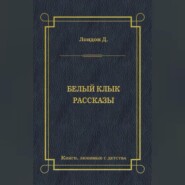По всем вопросам обращайтесь на: info@litportal.ru
(©) 2003-2024.
✖
On the Makaloa Mat/Island Tales
Настройки чтения
Размер шрифта
Высота строк
Поля
Apparently, down all the intervening centuries, the payment of the trade had not picked up. His father, his father's father, and himself, Ah Kim, had received the same invariable remuneration – per junk one-fourteenth of a cent, at the rate he had since learned money was valued in Hawaii. On long lucky summer days when the waters were easy, the junks many, the hours of daylight sixteen, sixteen hours of such heroic toil would earn over a cent. But in a whole year a towing coolie did not earn more than a dollar and a half. People could and did live on such an income. There were women servants who received a yearly wage of a dollar. The net- makers of Ti Wi earned between a dollar and two dollars a year. They lived on such wages, or, at least, they did not die on them. But for the towing coolies there were pickings, which were what made the profession honourable and the guild a close and hereditary corporation or labour union. One junk in five that was dragged up through the rapids or lowered down was wrecked. One junk in every ten was a total loss. The coolies of the towing guild knew the freaks and whims of the currents, and grappled, and raked, and netted a wet harvest from the river. They of the guild were looked up to by lesser coolies, for they could afford to drink brick tea and eat number four rice every day.
And Ah Kim had been contented and proud, until, one bitter spring day of driving sleet and hail, he dragged ashore a drowning Cantonese sailor. It was this wanderer, thawing out by his fire, who first named the magic name Hawaii to him. He had himself never been to that labourer's paradise, said the sailor; but many Chinese had gone there from Canton, and he had heard the talk of their letters written back. In Hawaii was never frost nor famine. The very pigs, never fed, were ever fat of the generous offal disdained by man. A Cantonese or Yangtse family could live on the waste of an Hawaii coolie. And wages! In gold dollars, ten a month, or, in trade dollars, two a month, was what the contract Chinese coolie received from the white-devil sugar kings. In a year the coolie received the prodigious sum of two hundred and forty trade dollars-more than a hundred times what a coolie, toiling ten times as hard, received on the eleventh cataract of the Yangtse. In short, all things considered, an Hawaii coolie was one hundred times better off, and, when the amount of labour was estimated, a thousand times better off. In addition was the wonderful climate.
When Ah Kim was twenty-four, despite his mother's pleadings and beatings, he resigned from the ancient and honourable guild of the eleventh cataract towing coolies, left his mother to go into a boss coolie's household as a servant for a dollar a year, and an annual dress to cost not less than thirty cents, and himself departed down the Yangtse to the great sea. Many were his adventures and severe his toils and hardships ere, as a salt-sea junk-sailor, he won to Canton. When he was twenty-six he signed five years of his life and labour away to the Hawaii sugar kings and departed, one of eight hundred contract coolies, for that far island land, on a festering steamer run by a crazy captain and drunken officers and rejected of Lloyds.
Honourable, among labourers, had Ah Kim's rating been as a towing coolie. In Hawaii, receiving a hundred times more pay, he found himself looked down upon as the lowest of the low – a plantation coolie, than which could be nothing lower. But a coolie whose ancestors had towed junks up the eleventh cataract of the Yangtse since before the birth of Christ inevitably inherits one character in large degree, namely, the character of patience. This patience was Ah Kim's. At the end of five years, his compulsory servitude over, thin as ever in body, in bank account he lacked just ten trade dollars of possessing a thousand trade dollars.
On this sum he could have gone back to the Yangtse and retired for life a really wealthy man. He would have possessed a larger sum, had he not, on occasion, conservatively played che fa and fan tan, and had he not, for a twelve-month, toiled among the centipedes and scorpions of the stifling cane-fields in the semi-dream of a continuous opium debauch. Why he had not toiled the whole five years under the spell of opium was the expensiveness of the habit. He had had no moral scruples. The drug had cost too much.
But Ah Kim did not return to China. He had observed the business life of Hawaii and developed a vaulting ambition. For six months, in order to learn business and English at the bottom, he clerked in the plantation store. At the end of this time he knew more about that particular store than did ever plantation manager know about any plantation store. When he resigned his position he was receiving forty gold a month, or eighty trade, and he was beginning to put on flesh. Also, his attitude toward mere contract coolies had become distinctively aristocratic. The manager offered to raise him to sixty fold, which, by the year, would constitute a fabulous fourteen hundred and forty trade, or seven hundred times his annual earning on the Yangtse as a two-legged horse at one- fourteenth of a gold cent per junk.
Instead of accepting, Ah Kim departed to Honolulu, and in the big general merchandise store of Fong & Chow Fong began at the bottom for fifteen gold per month. He worked a year and a half, and resigned when he was thirty-three, despite the seventy-five gold per month his Chinese employers were paying him. Then it was that he put up his own sign: AH KIM COMPANY, GENERAL MERCHANDISE. Also, better fed, there was about his less meagre figure a foreshadowing of the melon-seed rotundity that was to attach to him in future years.
With the years he prospered increasingly, so that, when he was thirty-six, the promise of his figure was fulfilling rapidly, and, himself a member of the exclusive and powerful Hai Gum Tong, and of the Chinese Merchants' Association, he was accustomed to sitting as host at dinners that cost him as much as thirty years of towing on the eleventh cataract would have earned him. Two things he missed: a wife, and his mother to lay the stick on him as of yore.
When he was thirty-seven he consulted his bank balance. It stood him three thousand gold. For twenty-five hundred down and an easy mortgage he could buy the three-story shack-building, and the ground in fee simple on which it stood. But to do this, left only five hundred for a wife. Fu Yee Po had a marriageable, properly small-footed daughter whom he was willing to import from China, and sell to him for eight hundred gold, plus the costs of importation. Further, Fu Yee Po was even willing to take five hundred down and the remainder on note at 6 per cent.
Ah Kim, thirty-seven years of age, fat and a bachelor, really did want a wife, especially a small-footed wife; for, China born and reared, the immemorial small-footed female had been deeply impressed into his fantasy of woman. But more, even more and far more than a small-footed wife, did he want his mother and his mother's delectable beatings. So he declined Fu Yee Po's easy terms, and at much less cost imported his own mother from servant in a boss coolie's house at a yearly wage of a dollar and a thirty- cent dress to be mistress of his Honolulu three-story shack building with two household servants, three clerks, and a porter of all work under her, to say nothing of ten thousand dollars' worth of dress goods on the shelves that ranged from the cheapest cotton crepes to the most expensive hand-embroidered silks. For be it known that even in that early day Ah Kim's emporium was beginning to cater to the tourist trade from the States.
For thirteen years Ah Kim had lived tolerably happily with his mother, and by her been methodically beaten for causes just or unjust, real or fancied; and at the end of it all he knew as strongly as ever the ache of his heart and head for a wife, and of his loins for sons to live after him, and carry on the dynasty of Ah Kim Company. Such the dream that has ever vexed men, from those early ones who first usurped a hunting right, monopolized a sandbar for a fish-trap, or stormed a village and put the males thereof to the sword. Kings, millionaires, and Chinese merchants of Honolulu have this in common, despite that they may praise God for having made them differently and in self-likable images.
And the ideal of woman that Ah Kim at fifty ached for had changed from his ideal at thirty-seven. No small-footed wife did he want now, but a free, natural, out-stepping normal-footed woman that, somehow, appeared to him in his day dreams and haunted his night visions in the form of Li Faa, the Silvery Moon Blossom. What if she were twice widowed, the daughter of a kanaka mother, the wearer of white-devil skirts and corsets and high-heeled slippers! He wanted her. It seemed it was written that she should be joint ancestor with him of the line that would continue the ownership and management through the generations, of Ah Kim Company, General Merchandise.
"I will have no half-pake daughter-in-law," his mother often reiterated to Ah Kim, pake being the Hawaiian word for Chinese. "All pake must my daughter-in-law be, even as you, my son, and as I, your mother. And she must wear trousers, my son, as all the women of our family before her. No woman, in she-devil skirts and corsets, can pay due reverence to our ancestors. Corsets and reverence do not go together. Such a one is this shameless Li Faa. She is impudent and independent, and will be neither obedient to her husband nor her husband's mother. This brazen-faced Li Faa would believe herself the source of life and the first ancestor, recognizing no ancestors before her. She laughs at our joss- sticks, and paper prayers, and family gods, as I have been well told – "
"Mrs. Chang Lucy," Ah Kim groaned.
"Not alone Mrs. Chang Lucy, O son. I have inquired. At least a dozen have heard her say of our joss house that it is all monkey foolishness. The words are hers – she, who eats raw fish, raw squid, and baked dog. Ours is the foolishness of monkeys. Yet would she marry you, a monkey, because of your store that is a palace and of the wealth that makes you a great man. And she would put shame on me, and on your father before you long honourably dead."
And there was no discussing the matter. As things were, Ah Kim knew his mother was right. Not for nothing had Li Faa been born forty years before of a Chinese father, renegade to all tradition, and of a kanaka mother whose immediate forebears had broken the taboos, cast down their own Polynesian gods, and weak-heartedly listened to the preaching about the remote and unimageable god of the Christian missionaries. Li Faa, educated, who could read and write English and Hawaiian and a fair measure of Chinese, claimed to believe in nothing, although in her secret heart she feared the kahunas (Hawaiian witch-doctors), who she was certain could charm away ill luck or pray one to death. Li Faa would never come into Ah Kim's house, as he thoroughly knew, and kow-tow to his mother and be slave to her in the immemorial Chinese way. Li Faa, from the Chinese angle, was a new woman, a feminist, who rode horseback astride, disported immodestly garbed at Waikiki on the surf-boards, and at more than one luau (feast) had been known to dance the hula with the worst and in excess of the worst, to the scandalous delight of all.
Ah Kim himself, a generation younger than his mother, had been bitten by the acid of modernity. The old order held, in so far as he still felt in his subtlest crypts of being the dusty hand of the past resting on him, residing in him; yet he subscribed to heavy policies of fire and life insurance, acted as treasurer for the local Chinese revolutionises that were for turning the Celestial Empire into a republic, contributed to the funds of the Hawaii-born Chinese baseball nine that excelled the Yankee nines at their own game, talked theosophy with Katso Suguri, the Japanese Buddhist and silk importer, fell for police graft, played and paid his insidious share in the democratic politics of annexed Hawaii, and was thinking of buying an automobile. Ah Kim never dared bare himself to himself and thrash out and winnow out how much of the old he had ceased to believe in. His mother was of the old, yet he revered her and was happy under her bamboo stick. Li Faa, the Silvery Moon Blossom, was of the new, yet he could never be quite completely happy without her.
For he loved Li Faa. Moon-faced, rotund as a water-melon seed, canny business man, wise with half a century of living – nevertheless Ah Kim became an artist when he thought of her. He thought of her in poems of names, as woman transmuted into flower- terms of beauty and philosophic abstractions of achievement and easement. She was, to him, and alone to him of all men in the world, his Plum Blossom, his Tranquillity of Woman, his Flower of Serenity, his Moon Lily, and his Perfect Rest. And as he murmured these love endearments of namings, it seemed to him that in them were the ripplings of running waters, the tinklings of silver wind- bells, and the scents of the oleander and the jasmine. She was his poem of woman, a lyric delight, a three-dimensions of flesh and spirit delicious, a fate and a good fortune written, ere the first man and woman were, by the gods whose whim had been to make all men and women for sorrow and for joy.
But his mother put into his hand the ink-brush and placed under it, on the table, the writing tablet.
"Paint," said she, "the ideograph of TO MARRY."
He obeyed, scarcely wondering, with the deft artistry of his race and training painting the symbolic hieroglyphic.
"Resolve it," commanded his mother.
Ah Kim looked at her, curious, willing to please, unaware of the drift of her intent.
"Of what is it composed?" she persisted. "What are the three originals, the sum of which is it: to marry, marriage, the coming together and wedding of a man and a woman? Paint them, paint them apart, the three originals, unrelated, so that we may know how the wise men of old wisely built up the ideograph of to marry."
And Ah Kim, obeying and painting, saw that what he had painted were three picture-signs – the picture-signs of a hand, an ear, and a woman.
"Name them," said his mother; and he named them.
"It is true," said she. "It is a great tale. It is the stuff of the painted pictures of marriage. Such marriage was in the beginning; such shall it always be in my house. The hand of the man takes the woman's ear, and by it leads her away to his house, where she is to be obedient to him and to his mother. I was taken by the ear, so, by your long honourably dead father. I have looked at your hand. It is not like his hand. Also have I looked at the ear of Li Faa. Never will you lead her by the ear. She has not that kind of an ear. I shall live a long time yet, and I will be mistress in my son's house, after our ancient way, until I die."
"But she is my revered ancestress," Ah Kim explained to Li Faa.
He was timidly unhappy; for Li Faa, having ascertained that Mrs. Tai Fu was at the temple of the Chinese AEsculapius making a food offering of dried duck and prayers for her declining health, had taken advantage of the opportunity to call upon him in his store.
Li Faa pursed her insolent, unpainted lips into the form of a half- opened rosebud, and replied:
"That will do for China. I do not know China. This is Hawaii, and in Hawaii the customs of all foreigners change."
"She is nevertheless my ancestress," Ah Kim protested, "the mother who gave me birth, whether I am in China or Hawaii, O Silvery Moon Blossom that I want for wife."
"I have had two husbands," Li Faa stated placidly. "One was a pake, one was a Portuguese. I learned much from both. Also am I educated. I have been to High School, and I have played the piano in public. And I learned from my two husbands much. The pake makes the best husband. Never again will I marry anything but a pake. But he must not take me by the ear – "
"How do you know of that?" he broke in suspiciously.
"Mrs. Chang Lucy," was the reply. "Mrs. Chang Lucy tells me everything that your mother tells her, and your mother tells her much. So let me tell you that mine is not that kind of an ear."
"Which is what my honoured mother has told me," Ah Kim groaned.
"Which is what your honoured mother told Mrs. Chang Lucy, which is what Mrs. Chang Lucy told me," Li Faa completed equably. "And I now tell you, O Third Husband To Be, that the man is not born who will lead me by the ear. It is not the way in Hawaii. I will go only hand in hand with my man, side by side, fifty-fifty as is the haole slang just now. My Portuguese husband thought different. He tried to beat me. I landed him three times in the police court and each time he worked out his sentence on the reef. After that he got drowned."
"My mother has been my mother for fifty years," Ah Kim declared stoutly.
"And for fifty years has she beaten you," Li Faa giggled. "How my father used to laugh at Yap Ten Shin! Like you, Yap Ten Shin had been born in China, and had brought the China customs with him. His old father was for ever beating him with a stick. He loved his father. But his father beat him harder than ever when he became a missionary pake. Every time he went to the missionary services, his father beat him. And every time the missionary heard of it he was harsh in his language to Yap Ten Shin for allowing his father to beat him. And my father laughed and laughed, for my father was a very liberal pake, who had changed his customs quicker than most foreigners. And all the trouble was because Yap Ten Shin had a loving heart. He loved his honourable father. He loved the God of Love of the Christian missionary. But in the end, in me, he found the greatest love of all, which is the love of woman. In me he forgot his love for his father and his love for the loving Christ.
"And he offered my father six hundred gold, for me – the price was small because my feet were not small. But I was half kanaka. I said that I was not a slave-woman, and that I would be sold to no man. My high-school teacher was a haole old maid who said love of woman was so beyond price that it must never be sold. Perhaps that is why she was an old maid. She was not beautiful. She could not give herself away. My kanaka mother said it was not the kanaka way to sell their daughters for a money price. They gave their daughters for love, and she would listen to reason if Yap Ten Shin provided luaus in quantity and quality. My pake father, as I have told you, was liberal. He asked me if I wanted Yap Ten Shin for my husband. And I said yes; and freely, of myself, I went to him. He it was who was kicked by a horse; but he was a very good husband before he was kicked by the horse.
"As for you, Ah Kim, you shall always be honourable and lovable for me, and some day, when it is not necessary for you to take me by the ear, I shall marry you and come here and be with you always, and you will be the happiest pake in all Hawaii; for I have had two husbands, and gone to high school, and am most wise in making a husband happy. But that will be when your mother has ceased to beat you. Mrs. Chang Lucy tells me that she beats you very hard."
"She does," Ah Kim affirmed. "Behold! He thrust back his loose sleeves, exposing to the elbow his smooth and cherubic forearms. They were mantled with black and blue marks that advertised the weight and number of blows so shielded from his head and face.
"But she has never made me cry," Ah Kim disclaimed hastily.
"Never, from the time I was a little boy, has she made me cry."
"So Mrs. Chang Lucy says," Li Faa observed. "She says that your honourable mother often complains to her that she has never made you cry."
A sibilant warning from one of his clerks was too late. Having regained the house by way of the back alley, Mrs. Tai Fu emerged right upon them from out of the living apartments. Never had Ah Kim seen his mother's eyes so blazing furious. She ignored Li Faa, as she screamed at him:
"Now will I make you cry. As never before shall I beat you until you do cry."
"Then let us go into the back rooms, honourable mother," Ah Kim suggested. "We will close the windows and the doors, and there may you beat me."
"No. Here shall you be beaten before all the world and this shameless woman who would, with her own hand, take you by the ear and call such sacrilege marriage! Stay, shameless woman."
"I am going to stay anyway," said Li Faa. She favoured the clerks with a truculent stare. "And I'd like to see anything less than the police put me out of here."

















